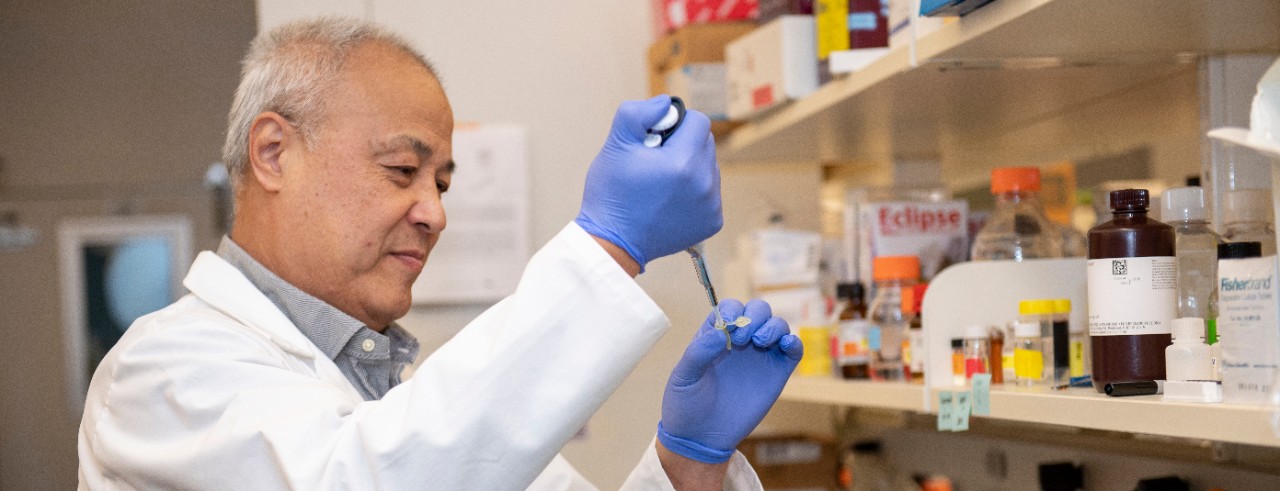
Nanosized, with huge potential
UC researcher continues work on a therapy that nudges the immune system to fight pancreatic cancer
Xiaoyang Qi is making a big difference by thinking small — nanosized, in fact.
Since the early 2000s, Qi, PhD, a professor in the Division of Hematology Oncology at the UC College of Medicine, has been tweaking his discovery, a treatment called SapC-DOPS, to address various types of cancers. It is now being studied in clinical trials for brain cancers.

Xiaoyang Qi received a $500,000 research grant from the Pancreatic Cancer Action Network. Photo/Colleen Kelley/UC Creative + Brand
The combination therapy — a cell protein (SapC) and a phospholipid or a lipid that is a component of cell membranes (DOPS) — is assembled into tiny cavities, called nanovesicles, to selectively target cancer cells and deliver therapies, all while sparing other noncancerous cells and tissues.
Now, Qi has received a $500,000 Translational Research Grant from the Pancreatic Cancer Action Network (PanCAN) to study how use of his nanoparticle could nudge the body’s immune system to fight cancer.
Qi, along with UC colleague Krushna Patra, PhD, was just one of 10 national winners of a 2020 PanCAN research award. Qi and Patra were also supported by important pilot grant funding through BSI Engineering.
“An exciting area of research that has great potential for improving outcomes for pancreatic cancer patients is understanding the role of the immune system in fighting the disease,” says Qi, who is also a member of the UC Cancer Center. “In normal circumstances, the immune system plays a key role in preventing the formation and growth of tumors, but it is now well known that many cancers, including pancreatic cancer, create a contained, protected tumor microenvironment, where the cancer lives and functions. This microenvironment allows tumors to escape the normal immune surveillance system.”
With this new project, Qi and his team will target the tumor microenvironment by blocking a protein released by pancreatic tumors. This protein usually protects the microenvironment by blocking the immune response to cancer cells, allowing them to survive and spread.
“We have preliminary data showing that blocking this protein with either neutralizing antibodies or with protein-lipid nanoparticles containing an agent called SapC-DOPG completely reverses immune suppression,” he says. “Using human cancer samples, we hope to confirm that this type of nanovesicle is specific to the cancer cells for pancreatic tumors and causes little side effects. We will also use pancreatic cancer animal models to assess how much of the protein is released in relation to tumor growth.”
This is the dream we all have as researchers — to see our basic science discoveries make a difference for patients.
Xiaoyang Qi
He adds that results for this study could be very promising, as past studies have shown benefit for treating other cancers.
“The results from this preclinical study in animal models could be rapidly applied to humans because we’ve seen success in phase I clinical trials using the same therapy in patients with brain tumors and other types of cancer,” he says.
“This is the dream we all have as researchers — to see our basic science discoveries make a difference for patients. I’m excited to continue research on this treatment and delivery system and to see if and how it can benefit patients with pancreatic cancer.”
Featured image of Xiaoyang Qi in his lab by Colleen Kelley/UC Creative + Brand.
Next Lives Here
The University of Cincinnati is classified as a Research 1 institution by the Carnegie Commission and is ranked in the National Science Foundation's Top-35 public research universities. UC's graduate students and faculty investigate problems and innovate solutions with real-world impact. Next Lives Here.
Related Stories
It’s a mindset: Meet the visionaries redefining innovation at...
December 20, 2024
Innovation is being redefined by enterprising individuals at UC’s 1819 Innovation Hub. Meet the forward thinkers crafting the future of innovation from the heart of Cincinnati.
UC students well represented in this year’s Inno Under 25 class
December 20, 2024
Entrepreneurialism runs through the veins of University of Cincinnati students, as confirmed by the school’s strong representation in this year’s Inno Under 25 class.
UC professor Ephraim Gutmark elected to National Academy of...
December 20, 2024
Ephraim Gutmark, distinguished professor of aerospace engineering at the University of Cincinnati, was elected to the 2024 class of the prestigious National Academy of Inventors.
